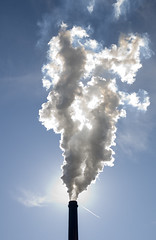by Dante AtkinsI remember the evening distinctly. It was early in 2007, on a night in late January, or perhaps early February. I was just on my way home from a political event that had run a little late, and the temperature was unseasonably cold. Bear in mind that by the standards of a Los Angeles winter, temperatures in the lower or middle forties count as unseasonably cold.
My path home took me through a canyon cutting across the Hollywood Hills that separate the San Fernando Valley from the greater Los Angeles basin. As my elevation rose, the outside temperature dropped. It was an overcast night with a hint of moisture in the air, and when I got to the top of the canyon, I saw something that will likely not be seen again around these parts for a few more years: snow flurries. An extremely light and fine dusting, to be sure, and not something that would count for anything by the harsh standards of an East Coast winter. But then, that's why people like to live in Los Angeles, precisely because that sort of thing is indeed such a rarity.
I happened to be waging an online argument with a climate denier conservative at the time--for some reason, it seemed like a worthwhile idea back then. And yes, he loved to bring up the fact that it had recently snowed in Laurel Canyon as evidence of the fact that global warming was bunk. Every single graph in the universe showing record average temperatures across the entire world meant nothing--because for one night, in one small portion of one city, something rare and unexpected had happened.
We went through the same thing on a national level just a few short months ago when the so-called "snowpocalypse" struck DC. Conservatives mocked Al Gore and crooned about the hoax that was global warming. And it didn't matter that climate science expressly indicated that extreme temperature fluctuations in both directions and uncharacteristic weather patterns in local areas were expected consequences of an average increase in global temperatures. The mockery continued unabated.
But now we're faced with a different set of statistics. Let's take a look at a small sample:
Iraq had its hottest day in history on June 14, 2010, when the mercury hit 52.0°C (125.6°F) in Basra. Iraq's previous record was 51.7°C (125.1°F) set August 8, 1937, in Ash Shu'aybah.
Pakistan had its hottest temperature in history on May 26, when the mercury hit an astonishing 53.5°C (128.3°F) at the town of MohenjuDaro, according to the Pakistani Meteorological Department. While this temperature reading must be reviewed by the World Meteorological Organization (WMO) for authenticity, not only is the 128.3°F reading the hottest temperature ever recorded in Pakistan, it is the hottest reliably measured temperature ever recorded on the continent of Asia.
Myanmar (Burma) had its hottest temperature in its recorded history on May 12, when the mercury hit 47°C (116.6°F) in Myinmu, according to the Myanmar Department of Meteorology and Hydrology. Myanmar's previous hottest temperature was 45.8°C (114.4°F) at Minbu, Magwe division on May 9, 1998. According to Chris Burt, author of the authoritative weather records book Extreme Weather, the 47°C measured this year is the hottest temperature in Southeast Asia history.
Ascention Island (St. Helena, a U.K. Territory) had its hottest temperature in history on March 25, 2010, when the mercury hit 34.9°C (94.8°C) at Georgetown. The previous record was 34.0°C (93.2°F) at Georgetown in April 2003, exact day unknown.
Just to name a few. Heck, it was even sweltering in DC this past week. And from the climate deniers on the right who mock us with every increasingly extreme winter? Not a word. No surprise there, of course. Hard to come up with anything when you have no integrity or respect for the truth, as long as it serves your personal and political agenda.
continued at Daily Kos...
 energy future ... indefinitely.
energy future ... indefinitely.